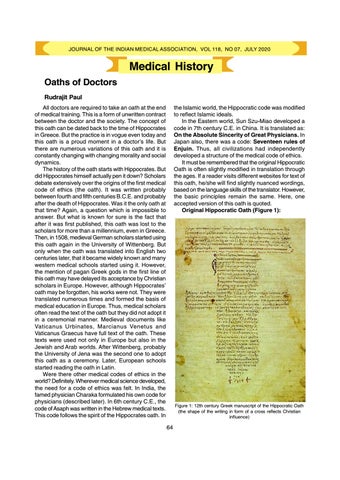JOURNAL OF THE INDIAN MEDICAL ASSOCIATION, VOL 118, NO 07, JULY 2020
Medical History Oaths of Doctors Rudrajit Paul All doctors are required to take an oath at the end of medical training. This is a form of unwritten contract between the doctor and the society. The concept of this oath can be dated back to the time of Hippocrates in Greece. But the practice is in vogue even today and this oath is a proud moment in a doctor’s life. But there are numerous variations of this oath and it is constantly changing with changing morality and social dynamics. The history of the oath starts with Hippocrates. But did Hippocrates himself actually pen it down? Scholars debate extensively over the origins of the first medical code of ethics (the oath). It was written probably between fourth and fifth centuries B.C.E. and probably after the death of Hippocrates. Was it the only oath at that time? Again, a question which is impossible to answer. But what is known for sure is the fact that after it was first published, this oath was lost to the scholars for more than a millennium, even in Greece. Then, in 1508, medieval German scholars started using this oath again in the University of Wittenberg. But only when the oath was translated into English two centuries later, that it became widely known and many western medical schools started using it. However, the mention of pagan Greek gods in the first line of this oath may have delayed its acceptance by Christian scholars in Europe. However, although Hippocrates’ oath may be forgotten, his works were not. They were translated numerous times and formed the basis of medical education in Europe. Thus, medical scholars often read the text of the oath but they did not adopt it in a ceremonial manner. Medieval documents like Vaticanus Urbinates, Marcianus Venetus and Vaticanus Graecus have full text of the oath. These texts were used not only in Europe but also in the Jewish and Arab worlds. After Wittenberg, probably the University of Jena was the second one to adopt this oath as a ceremony. Later, European schools started reading the oath in Latin. Were there other medical codes of ethics in the world? Definitely. Wherever medical science developed, the need for a code of ethics was felt. In India, the famed physician Charaka formulated his own code for physicians (described later). In 6th century C.E., the code of Asaph was written in the Hebrew medical texts. This code follows the spirit of the Hippocrates oath. In
the Islamic world, the Hippocratic code was modified to reflect Islamic ideals. In the Eastern world, Sun Szu-Miao developed a code in 7th century C.E. in China. It is translated as: On the Absolute Sincerity of Great Physicians. In Japan also, there was a code: Seventeen rules of Enjuin. Thus, all civilizations had independently developed a structure of the medical code of ethics. It must be remembered that the original Hippocratic Oath is often slightly modified in translation through the ages. If a reader visits different websites for text of this oath, he/she will find slightly nuanced wordings, based on the language skills of the translator. However, the basic principles remain the same. Here, one accepted version of this oath is quoted. Original Hippocratic Oath (Figure 1):
Figure 1: 12th century Greek manuscript of the Hippocratic Oath (the shape of the writing in form of a cross reflects Christian influence)
64
